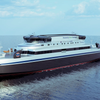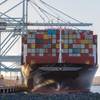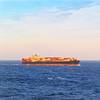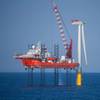Major Conference Marks Helios Final Phase
EU-funded initiative on gas-fuelled, two-stroke ship engines
A major international conference on November 27 in Copenhagen marked the final phase of the EU-funded Helios project. Helios is a cooperation research project within the EU´s seventh Framework Program for Research and Technical Development/Transportation with MAN Diesel & Turbo acting as coordinating partner. The general objective of the project is to develop a research platform for an electronically controlled, two-stroke, low-speed, marine diesel engine that operates on the principle of the direct injection of HP Compressed Natural Gas (CNG) to meet the needs of the emerging LNG market. A large audience of 100 experts from around the world attended the conference to hear presentations on the gas-engine technologies garnered from Helios as well as on other factors influencing the development of gas-fuelled ship engines.
Activities and results
A broad range of activities were initiated over the past three years under the Helios framework. A concrete result was the development of the new, gas-fuelled ME-GI engine, a dual-fuel unit that MAN Diesel & Turbo has since released to the market with success. Generally speaking, Helios has generated many, positive results and increased the knowledge base in several technical fields, including the development of gas-engine components; a new gas injection valve and other main components; a gas-control block; a new gas-composition sensor; a new handheld calibration device; a dedicated control and safety system; laser-optical, temperature-measurement technology; new high-temperature materials and the analysis of potential tribology and corrosion problems.
First orders of gas-fuelled ship engines
As previously mentioned, Helios’ most significant result is the development of the ME-GI engine, utilizing the direct-injection principle, a concept the market has embraced and which several shipowners have already placed orders for. Recently, Matson (USA) ordered two giant ME-GI gas engines – the largest dual-fuel engines ever ordered in terms of power output – for two new container vessels, while American TOTE and Canadian Teekay also signed ME-GI orders at the very end of 2012 and will become owners of the most environmentally friendly, two-stroke, low-speed vessels in the world with the first scheduled to be complete in 2014.
MAN Diesel & Turbo assesses the potential for more orders in this new, emerging market segment as great.
Cooperation
The Helios results were gathered through an innovative collaboration with an array of different universities and companies. A research platform was constructed at MAN Diesel & Turbo in Copenhagen, where various ideas were tested and components subsequently developed.
Environmental benefits
The ME-GI engine complies with the IMO’s Tier II requirements and, in combination with EGR (Exhaust Gas Recirculation), its emissions are below Tier III limits. A particularly significant, environmental benefit is the ME-GI’s very low methane slip.
helios-fp7.eu











